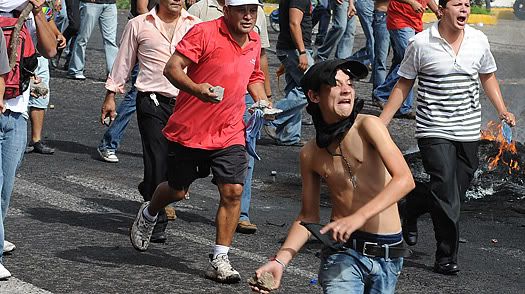With the 3-day period imposed by OAS for the restoration of democracy and the Presidency of Manual Zelaya in Honduras slowly ticking down, diplomacy is proceeding between OAS and Roberto Micheletti’s government. The military coup has imposed a harsh curfew, a feature of which is the withdrawal of various civil rights. Neither side has so far blinked. No progress in resolving the coup has been reported.
According to the New York Times OAS diplomacy to end the military coup in Honduras is proceeding. The United States role in this apparently is to give a cold shoulder to the coup, to cut off joint military operations, and to threaten a cessation of all aid if Zelaya is not restored to the presidency.
As the public standoff between Honduras and the rest of the world hardened, quiet negotiations got under way on Wednesday to lay the groundwork for a possible return of the nation’s ousted president, Manuel Zelaya.
After a marathon session that stretched close to dawn, the Organization of American States “vehemently” condemned the removal of Mr. Zelaya over the weekend and issued an ultimatum to Honduras’s new government: Unless Mr. Zelaya is returned to power within 72 hours, the nation will be suspended from the group.
Diplomats said they had rarely seen the hemisphere’s leaders unite so solidly behind a common cause.
The new Honduran government was equally resolute, warning that there was no chance Mr. Zelaya would be restored to office and that the nation would defend itself by force.
Both sides have stated their positions. Both appear inflexible. Has there been any movement? No. The OAS secretary general, José Miguel Insulza, went to Tegucigalpa today for further talks. Proposals being discussed involve an amnesty for the golpistas, Manual Zelaya saying he won’t seek an additional term, and restoration of Zelaya as President. Also, members of the Congress in Honduras are reportedly looking for a compromise. Details of those proposals aren’t available.
Meanwhile, according to the Times, the conflict in Honduras continues to be highly polarized:
Demonstrations for and against the new government continued in Tegucigalpa and other cities across the country [on Wednesday]. Then, in a move to crack down on the opposition, the nation’s Congress approved a decree on Wednesday that applies during the overnight curfew and allows security forces to arrest people at home and hold them for more than 24 hours.
“It’s for the tranquillity of the country,” said the new president, Roberto Micheletti.
The government has accused pro-Zelaya demonstrators of vandalism and violence, noting that a grenade, which did not explode, was hurled at the Supreme Court on Tuesday. Those who oppose the government, meanwhile, accuse the security forces of stifling dissent through brutality.
The withdrawal of civil rights is serious. It includes curtailing the right to assemble and to seek redress from the Government as well as the right not to be held without charge for more than 24 hours. These measures apparently permit the Government to detain the opposition if the arrests are made during the curfew:
According to Honduras’ El Tiempo, the following constitutional guarantees have been suspended:
* Article 69, which guarantees the personal freedom.
* Article 71, which states that no one can be detained or held incommunicado for more than 24 hours without an arrest warrant.
* Article 78, which guarantees freedom of association and freedom of assembly.
* Article 81, which states, “Everyone has the right to free movement, to leave, enter and remain in national territory.”El Tiempo reports that with the aforementioned guarantees suspended, “no one can hold meetings, neither public nor private, be it in the streets, in churches, in their own homes, or in union or guild halls.”
Meanwhile, Kristin Bricker reports:
he anti-coup movement’s momentum appears to be building across Honduras, with protests reported across the country. Meanwhile, international pressure builds against the coup government.
Over the past two days, anti-coup protests were reported in Tocoa, Colon; San Pedro Sula; La Ceiba; El Progreso, Yoro; Tegucigapla; Intibuca; El Paraiso; Olancho; Santa Barbara; and all over President Zelaya’s native department of Olancho. Moreover, the BBC reports that citizens have blocked major highways in Copan and Tocoa. The BBC’s sources on the ground in Honduras say anti-coup protests have occurred in the majority of Honduras’ departments.
And so, we sit and wait. I hope there will be a diplomatic resolution of the problem and a restoration of democracy in Honduras. In the meanwhile, there is very little any of us can do except to watch and to spread the news.
———–
cross-posted from The Dream Antilles


6 comments
Skip to comment form
And of course the MSM is worried about Michael Jackson’s estate.
Author
backyard. I know this has slipped off the front pages.
Thanks for reading.
for this. Was out of touch for a few days & was wondering how things were going in Honduras.
Don’t want to see the Central & South American implosions of my youth recur…esp. after situations seemed to have stabilized since RayGun.
Then again, it’s difficult to know what illegal crap our government is perpetrating down there.